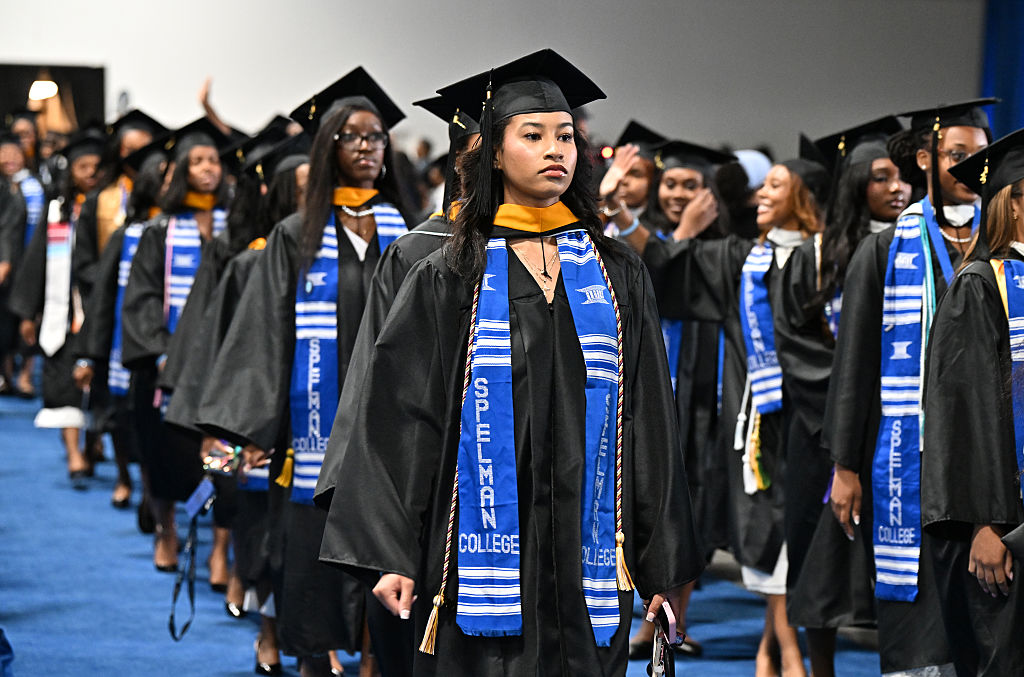(NewsOne) —
Updated: May 23, 2025 at 10 AM EST
Black women have long been celebrated for their educational achievements, but does the narrative still hold true that they are the “most educated” in 2025? Recent data suggests that Black women are still making significant strides in higher education, though broader challenges remain.
According to 2024 data from Pew Research, Black women continue to lead academically at colleges and universities across the U.S. Approximately 38% of young Black women have earned a college degree, compared to just 26% of Black men. This marks a dramatic shift from 30 years ago, when only 14% of Black women and 16% of Black men had bachelor’s degrees. However, Black women still trail behind other ethnic groups in bachelor’s degree attainment. During the same period, 77% of young Asian women and 52% of white women earned a bachelor’s degree, compared to a lower percentage of Black women.
Within higher education, Black women consistently outpace their male counterparts. According to the American Association of University Women (AAUW), Black women earn 64.1% of all bachelor’s degrees awarded to Black students, 71.5% of master’s degrees, and 65.9% of doctoral, medical, and dental degrees.
Notably, in fall 2022, women of color accounted for 24.8% of total postsecondary enrollment and 42.8% of all female student enrollment, per the Postsecondary National Policy Institute. Among them, Hispanic or Latina women made up 12.2%, Black women 8%, Asian women 4%, American Indian/Alaska Native women 0.4%, and Native Hawaiian/Pacific Islander women 0.1%.
So, while Black women continue to outpace Black men in educational attainment, structural and equity-driven efforts are still needed to ensure they achieve comparable success alongside other ethnic groups.
Not all degrees lead to high-paying jobs.
A more complex picture emerges when it comes to economic outcomes. Black women are still underrepresented in high-paying, high-growth fields such as STEM. Instead, they are overrepresented in lower-earning majors. The AAUW noted that the top majors for Black women include health and medical administration services (21%), human services and community organization (20%), social work (19%), and public administration (17%). These fields typically yield starting salaries ranging from $40,000 to $96,000, depending on location and experience, considerably less than starting salaries in STEM fields, where graduates can expect to earn around $57,900 initially and over $108,000 mid-career, according to Big Economics.
Black women suffered the most job losses in April.
Beyond the wage gap, job stability is becoming a growing concern. Black women, despite strong academic credentials, face disproportionate impacts from recent economic instability. April’s jobs report from the U.S. Bureau of Labor Statistics showed that while the economy added over 170,000 jobs, Black women experienced the steepest job losses of any group. Employment among Black women fell from 10.325 million in March to 10.219 million in April, a loss of 106,000 jobs. Their unemployment rate surged from 5.1% to 6.1%, marking the largest month-over-month increase across all demographics.
Since February 2025, Black women have lost a total of 304,000 jobs. Meanwhile, overall Black unemployment has risen for the third consecutive month, reaching 6.3%—the highest since January. Interestingly, Black men saw modest gains during the same period, with their unemployment rate dropping from 6.1% to 5.6%.
Black women remain a powerful force in higher education, but systemic barriers persist, particularly in access to lucrative fields and job security. The data shows both progress and persistent inequity. The challenge moving forward is not only continuing to support Black women in higher education but also ensuring they have equitable access to the economic opportunities that education should afford.
SEE ALSO:
Beyond Betrayal: Black Women’s Fight For Equity In The Time Of Trump
Black Women AGs Lead Charge Against Trump Admin’s Attack On Public Health
—
Read More News from News One
